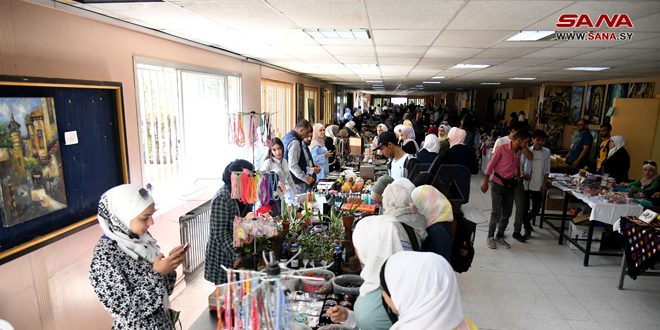140 artisans in the exhibition of authentic traditional crafts at the Faculty of Arts at Damascus University
140 craftsmen of different specializations and governorates participate in the exhibition of authentic traditional crafts accompanying the Conference on Modernity and Renewal in the Arab Heritage, which is held by the Faculty of Arts and Humanities at Damascus University in cooperation with the Arab Writers Union and the General Union of Craftsmen.
Khaled Fayyad, director of the Commercial House of the General Union of Craftsmen and supervisor of the exhibition, pointed out that the exhibition is comprehensive and qualitative, and includes many crafts such as shells, damask paint, stone mosaics, engravings, copper and ancient fabrics such as “brocade and Aghabani.”
Fayyad pointed out that Damascus University was chosen as a venue for the exhibition, with the aim of introducing the younger generation to his country’s ancient heritage.
The craftsman Fouad Arbash, head of the Craftsman Association for Oriental Products in Damascus, said: The association participates with more than a hundred craftsmen in the fields of glass, copper, wooden, weaving, accessories, traditional ornaments and many other crafts that craftsmen have excelled in during the crisis period despite the difficult circumstances, indicating that the exhibition is an important step and initiative to preserve the heritage of the ancestors and to familiarize the present generation with its rich and authentic heritage.
Adnan Tanbakji, Craft Master “Sheikh Carr” of Copper and Traditional Arts, said that participating in the exhibition and honoring it encourages craftsmen to continue in the issue of modernity and preserve the Syrian heritage, pointing out that the university promised that this exhibition would be permanent and annually to display the products of craftsmen and teach students the ways and methods of their manufacture.
Craftsman Maher Buzo, a participant in the Damascene paint craft, said: This craft is 1400 years old and had its beginning in the Umayyad era, and it has continued until now despite the developments and difficulties it has gone through.
The craftsmen Munther Al-Ghubra and Muhammad Issa from Damascus explained that they work in the manufacture of wooden mosaics, inlaying engravings and downloading seashells. Their products include all oriental antiques and furniture, down to small gifts.
The craftsman Ziad Al-Shayeb indicated that he participates in the craft of unloading copper and oriental copper, and it is considered one of the authentic Damascene heritage in the the Levant.
A group of other participants focused on the manufacture of products and preparations made of natural materials. The student, Mansour Tobel, from the Department of Philosophy at the Faculty of Arts, pointed out that he participates in a variety of handmade soaps, consisting of glycerin, materials, natural oils and water extracts that are suitable for all skin types, indicating that each type of them has its own benefit and has different advantages over others.
The craftswoman, Huda Al-Hinnawi, participates in the field of medical soap, shampoo and perfumes, which are made from raw materials that are used to treat skin diseases, while the craftsman Reda Ali Deeb specializes in the manufacture of handmade and natural preparations of honey and propolis with creams, shampoos and natural oils.
The exhibition of traditional crafts was inaugurated yesterday at the Faculty of Arts at Damascus University on the sidelines of the Conference on Modernity and Renewal in the Arab Heritage and will continue until the twentieth of this month.
NR

